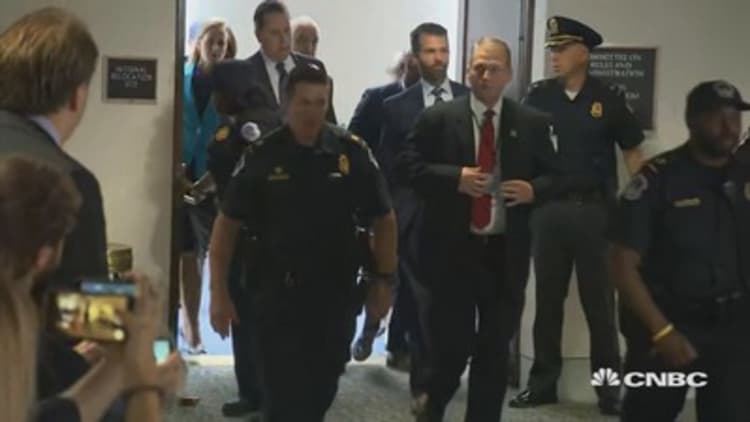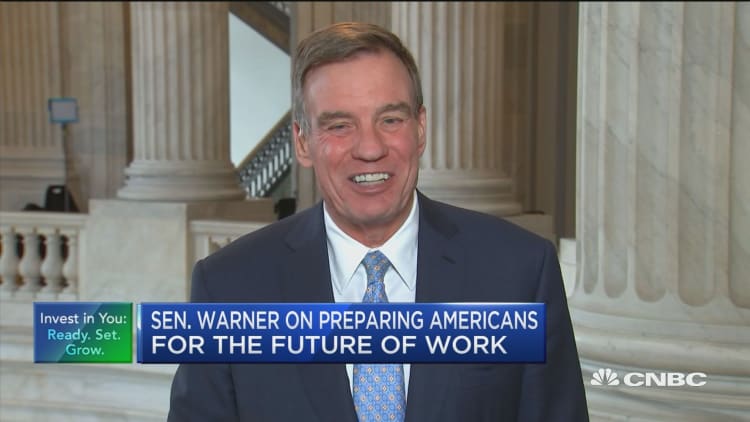
President Donald Trump's eldest son, Donald Trump Jr., on Wednesday testified behind closed doors before the Senate Intelligence Committee, whose members were set to ask him about his awareness of an aborted plan to build a Trump Tower in Moscow.
Trump told reporters before the hearing that there was "nothing to correct" about his prior testimony before the Intelligence Committee, and said afterward that he is "not at all" worried about being accused of perjury.
The Republican-led committee subpoenaed Trump Jr. in May to answer questions about his claim to have only limited knowledge of the Trump Tower project, and potentially a broad range of other subjects.
After objecting to the scope of that subpoena, Trump Jr. cut a deal later in May with the Intelligence Committee, which agreed to limit its questions to six topics.
In addition to the plan to build a Trump Tower in Russia, Trump Jr. is expected to be asked about his controversial meeting with a Russian lawyer who has ties to the Kremlin at Trump Tower in Manhattan in June 2016.
That lawyer claimed to have dirt on Hillary Clinton, the then-presumptive Democratic presidential nominee.
Trump Jr.'s prior testimony before the same Senate committee, which came in December 2017, was called into question earlier this year by his father's former personal lawyer, Michael Cohen, who told a House panel that he had briefed the younger Trump repeatedly about his efforts during the 2016 presidential campaign to seal a deal to build a Trump-branded tower in Moscow.
Cohen told the House committee that he had met with Trump Jr. and his sister Ivanka Trump about 10 times to brief them about the Trump Tower plan.
As he arrived for his testimony on Wednesday, Trump Jr. was asked by a reporter why he was there and "are you here to correct your testimony?"
"Nothing to correct," answered Trump Jr.
After he testified, he told reporters, "The reality, there was nothing to change.
"If there needed to be clarification because Michael Cohen — who let's not forget is serving time right now for lying to these very investigative bodies — I'm happy do that," Trump Jr. said.
"I don't think I changed anything of what I said because there was nothing to change. I'm glad that this is finally over, we're able to put some final clarity on that, and I think the committee understands that," he said.
A reporter then asked if he was "worried about perjury?"
"Not at all," Trump Jr. said.
The Intelligence Committee's vice chairman, Sen. Mark Warner, D-Virginia, during an appearance on CNBC's "Closing Bell," declined to discuss what Trump Jr. told the panel.
"I'm not going to comment about any of our witnesses," Warner said in response to a question about Trump Jr.'s testimony.
"I'm very proud of the fact that our committee is the last bi-partisan effort looking in to what Russia did in 2016. We'll finish our work shortly."

But Warner also said twice during the interview that it should be mandated that presidential election campaigns report — as Trump's campaign did not during the 2016 campaign — contacts with agents of foreign governments to U.S. law enforcement authorities.
"What I think is as important if not more important, we've got 2020 around the corner, and whether it's Russians or others they've seen a playbook now," he said.
"It's cheap to interfere in our democracy and we need to step up and make sure that there is a proactive requirement to report foreign intervention to law enforcement regardless of what campaign they intervene with," Warner said.


